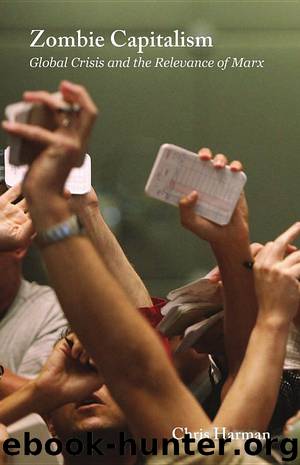Zombie Capitalism by Chris Harman

Author:Chris Harman
Language: eng
Format: epub
Publisher: Haymarket Books
Their analysis was partially vindicated in 1970 when attempts to resolve a crisis caused by over-investment at the expense of living standards led to workers occupying the country’s Baltic shipyards, attacks on them by the police and the enforced resignation of the country’s leader, Gomulka. But at first it seemed that the new leadership had found a way out of the crisis, with a new boom based on massively expanding trade with the West and borrowing from Western banks which permitted imports to rise by 50 percent in 1972 and 89 percent in 1973.
Polish state capitalism was overcoming the limits to accumulation created by the narrowness of its national economy by integration into the world economy through market competition. The other side of this, however, was that the Polish economy was bound to suffer whenever the world economy went into recession. And dependency on the rest of the world system for inputs to production and for export earnings prevented the state shifting resources from one sector of the economy to another so as to ward off any incipient internal recession turning into an actual one. From 1980 to 1982 there developed “a crisis unprecedented in the history of Europe since the second world war”.58 The “national net material product” fell by nearly a third; prices increased by 24 percent in 1981 and 100 percent in 1982; and real wages fell by about a fifth.59
The regime attempted to place the burden of the crisis on the mass of workers—and produced a sudden upsurge of resistance through the Solidarnosc workers’ movement. The events served as a warning to the whole of the Russian bloc. Soviet-style state capitalism was not immune to a crisis similar in important ways to that then hitting Western state monopoly capitalism. Both had their roots in the system of competitive accumulation as a whole.60 Catastrophic crisis was inevitable at some point in the not too distant future throughout the Soviet bloc—including in the USSR itself:
By 1981, the choice between maintaining the closed economy and opening up to the rest of the world was indeed the choice between the frying pan and the fire. The first option meant deepening stagnation, growing waste, an inability to satisfy the demands of the mass of the population, and the continual danger of working class rebellion. The second option meant binding oneself into the rhythm of a world economy increasingly prone to stagnation and recession—and giving up the administrative means to stop recession involving contraction of the domestic economy. That is why the Polish crisis of 1980-81 was so traumatic for all the rulers of Eastern Europe. It proved there was no easy solution to the problems besetting every state.61
Download
This site does not store any files on its server. We only index and link to content provided by other sites. Please contact the content providers to delete copyright contents if any and email us, we'll remove relevant links or contents immediately.
| Anarchism | Communism & Socialism |
| Conservatism & Liberalism | Democracy |
| Fascism | Libertarianism |
| Nationalism | Radicalism |
| Utopian |
The Secret History by Donna Tartt(16704)
The Social Justice Warrior Handbook by Lisa De Pasquale(11501)
Thirteen Reasons Why by Jay Asher(7823)
This Is How You Lose Her by Junot Diaz(5815)
Weapons of Math Destruction by Cathy O'Neil(5067)
Zero to One by Peter Thiel(4856)
The Myth of the Strong Leader by Archie Brown(4804)
Promise Me, Dad by Joe Biden(4467)
Beartown by Fredrik Backman(4457)
How Democracies Die by Steven Levitsky & Daniel Ziblatt(4438)
Stone's Rules by Roger Stone(4433)
The Fire Next Time by James Baldwin(4362)
100 Deadly Skills by Clint Emerson(4102)
A Higher Loyalty: Truth, Lies, and Leadership by James Comey(4049)
Rise and Kill First by Ronen Bergman(4036)
The David Icke Guide to the Global Conspiracy (and how to end it) by David Icke(3905)
The Farm by Tom Rob Smith(3889)
Secrecy World by Jake Bernstein(3800)
The Doomsday Machine by Daniel Ellsberg(3747)
